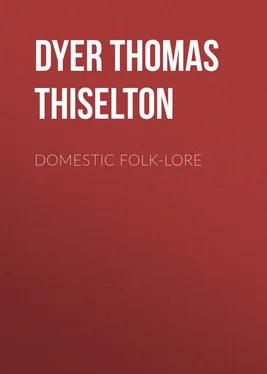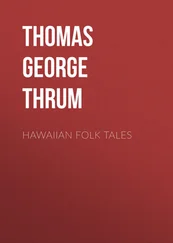Thomas Dyer - Domestic folk-lore
Здесь есть возможность читать онлайн «Thomas Dyer - Domestic folk-lore» — ознакомительный отрывок электронной книги совершенно бесплатно, а после прочтения отрывка купить полную версию. В некоторых случаях можно слушать аудио, скачать через торрент в формате fb2 и присутствует краткое содержание. Жанр: foreign_antique, foreign_prose, на английском языке. Описание произведения, (предисловие) а так же отзывы посетителей доступны на портале библиотеки ЛибКат.
- Название:Domestic folk-lore
- Автор:
- Жанр:
- Год:неизвестен
- ISBN:нет данных
- Рейтинг книги:4 / 5. Голосов: 1
-
Избранное:Добавить в избранное
- Отзывы:
-
Ваша оценка:
- 80
- 1
- 2
- 3
- 4
- 5
Domestic folk-lore: краткое содержание, описание и аннотация
Предлагаем к чтению аннотацию, описание, краткое содержание или предисловие (зависит от того, что написал сам автор книги «Domestic folk-lore»). Если вы не нашли необходимую информацию о книге — напишите в комментариях, мы постараемся отыскать её.
Domestic folk-lore — читать онлайн ознакомительный отрывок
Ниже представлен текст книги, разбитый по страницам. Система сохранения места последней прочитанной страницы, позволяет с удобством читать онлайн бесплатно книгу «Domestic folk-lore», без необходимости каждый раз заново искать на чём Вы остановились. Поставьте закладку, и сможете в любой момент перейти на страницу, на которой закончили чтение.
Интервал:
Закладка:
It may not be inappropriate to allude here to the superstitions relative to confirmation, following in due time, as this rite does, on baptism. In Norfolk, for instance, it is considered unlucky to be touched by the bishop's left hand; and in Devonshire, also, where a similar notion prevails, young people look upon his right hand as the lucky one, and should it not be their privilege to receive it, they leave the church much disappointed. In some of the northern counties, we are informed that the unfortunate recipients of the left hand are doomed, then and there, to a life of single blessedness. This is not the only species of superstition belonging to confirmation, for instances are on record of persons who, although confirmed in their early life, have again presented themselves for confirmation in their old age, under a conviction that the bishop's blessing would cure them of some bodily ailment. It is related that, at one of the confirmations of the venerable Bishop Bathurst, an old woman was observed eagerly pressing forward to the church. A by-stander, somewhat amazed at her odd conduct, and struck with her aged appearance, inquired if she was going to be confirmed, and, being answered in the affirmative, expressed his astonishment that she should have procrastinated it to such an advanced time of life. The old woman, however, resented his reproof, replying "that it was not so; that she had already been bishopped seven times, and intended to be again, it was so good for her rheumatism!"
In some cases the prayers taught by the poor to their children are curious. Thus, a popular prayer, formerly in use, and not yet forgotten, is evidently a relic of Roman Catholic times, having been handed down from a period anterior to the Reformation. As the reader will see, the version below contains a distinct appeal to certain saints for their intercession with God on the child's behalf: —
"Matthew, Mark, Luke, and John,
Bless the bed I lie upon;
Four corners to my bed,
Four angels at its head,
One to watch, two to pray,
And one to bear my soul away;
God within and God without,
Sweet Jesus Christ all round about;
If I die before I wake,
I pray to God my soul to take."
It has been pointed out that it is very singular that this prayer should have survived the great change which took place in religious opinion in the sixteenth century, and that it even still remains in use. There are many variations of it, and the following two distiches obtained from Lancashire are quaint, having been written, it has been thought, by the Puritans, in ridicule: —
"Matthew, Mark, Luke, and John,
Hold the horse that I leap on.
Matthew, Mark, Luke, and John,
Take a stick and lay upon."
A Lincolnshire clergyman, anxious to learn something of the nature of the prayers said by the children of the agricultural poor, visited some of their cottages a few years ago in the evening, and listened to the little ones as they said their prayers. The concluding portion, he tells us, was always intercession for relations, but the form it generally took was peculiar. In the first place, it was not, as is the case with the more educated classes, "Pray God bless father and mother," &c., but "Pray for father, pray for mother, pray for brothers and sisters," and so on. In certain cases, through carelessness and rapidity, the words had degenerated into "Pray father, pray mother," &c. There can be no doubt that originally the prayer was this: – "Pray for father;" then a Pater noster , or an Ave Maria , or both, would be said; then "Pray for mother," &c. After the Reformation, as time went on, the constant repetition of the Pater and the use of the Ave Maria would gradually die out with the change of religious ideas, and thus the prayer would assume its present form, "Pray for father, pray for mother."
Referring, in the second place, to the superstitions of children, we find an immense number of curious rhymes on various subjects used by them throughout the country. While many of these have, no doubt, been taught them by nurserymaids, a great part, as Mr. Chambers has pointed out in his "Popular Rhymes of Scotland," may be thought to have taken their rise in the childish imagination during that familiar acquaintance with natural objects, which it is one of the most precious privileges of the young to enjoy in rural districts. Besides, too, we must not forget that children seem to have a peculiar love for all natural objects, often finding pleasure in looking at some wayside flower, or in watching the movements of some tiny insect, which in after-years do not bring them the same interest. The fact, indeed, that the young mind is a true admirer of nature in all probability accounts for many of those pleasing rhymes which constitute much of the child's folk-lore.
Some of the charms, for instance, used to influence the weather are curious, and it is worthy of note that these, in many cases, are not confined to childhood only, but are frequently found in the mouths of our peasants. Thus the child's appeal to rain for its departure has become a general charm, and is familiar to most readers: —
"Rain, rain, go to Spain,
Fair weather, come again."
Aubrey considers this rhyme of great antiquity, and says that "it is derived from the Gentiles." Often in summer-time, when a thunder-shower interrupts some out-door game, one may hear a chorus of young voices shouting —
"Rain, rain, go away,
Come another summer's day."
Or, as other versions have it, "Come again on washing-day." The appearance of a rainbow is generally, too, the signal for various marks of dissatisfaction on the part of the young, who, besides entreating it to vanish as soon as possible, frequently try to charm it away. This they do by placing a couple of straws or twigs crossways on the ground, and so, to quote their phrase, "cross out the rainbow." Another way is to make a cross of two sticks, and to lay four pebbles on it, one at each end. Again, some of the rhymes relating to snow are highly quaint, the following being repeated when it makes its first appearance: —
"The men of the East
Are picking their geese,
And sending their feathers here away, here away."
When, however, boys wish the snow to go away, they sing: —
"Snow, snow, give over,
The cow's in the clover."
Thunder, in the North of England, is called by children "Rattley-bags," and during a storm the boys are in the habit of singing: —
"Rowley, Rowley, Rattley-bags,
Take the lasses and leave the lads."
There is a rhyme which is often repeated by the juvenile folks in the north and midland counties upon seeing the new moon, which, perhaps, may have an indirect allusion to its supposed lucky influence: —
"I see the moon and the moon sees me,
God help the parson that baptised me!" —
containing, evidently, a congratulation upon their birth. Boys, too, have a curious saying respecting the reflection of the sun's beams upon a ceiling, which they term "Jack-a-dandy beating his wife with a stick of silver." If a mischievous boy, with a piece of looking-glass, throws the reflection into the eyes of a neighbour, the latter complains "he's throwing Jack-a-dandy in my eyes."
Passing on to other charm-rhymes connected with natural objects, there are a very numerous class relating to the animal creation. In evening-time, for instance, when the dew begins to fall, boys are fond of hunting the large black snails, on discovering which they exclaim: —
"Snail, snail, put out your horn,
Or I'll kill your father and mother i' th' morn."
Интервал:
Закладка:
Похожие книги на «Domestic folk-lore»
Представляем Вашему вниманию похожие книги на «Domestic folk-lore» списком для выбора. Мы отобрали схожую по названию и смыслу литературу в надежде предоставить читателям больше вариантов отыскать новые, интересные, ещё непрочитанные произведения.
Обсуждение, отзывы о книге «Domestic folk-lore» и просто собственные мнения читателей. Оставьте ваши комментарии, напишите, что Вы думаете о произведении, его смысле или главных героях. Укажите что конкретно понравилось, а что нет, и почему Вы так считаете.












